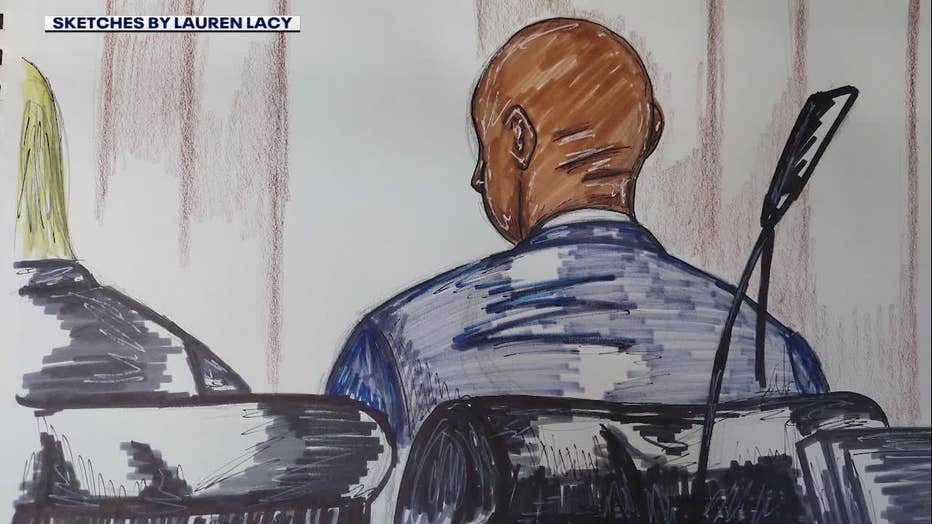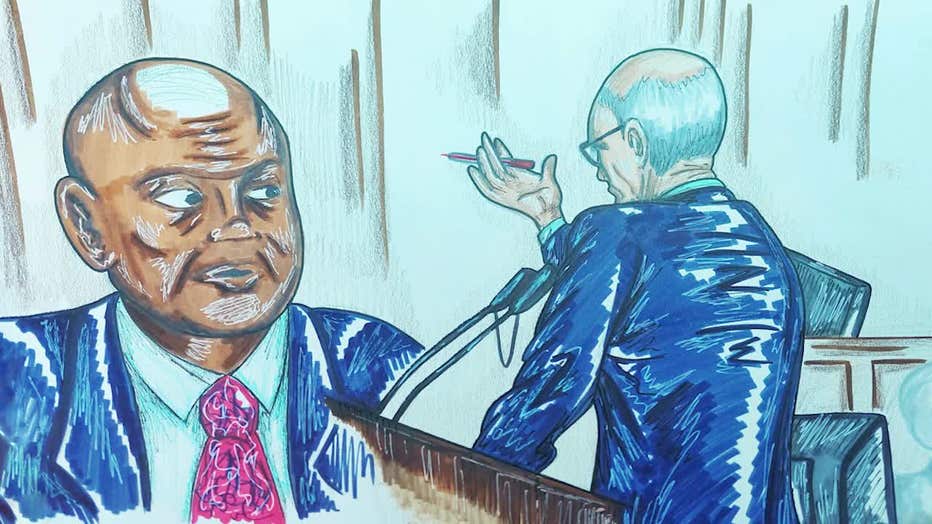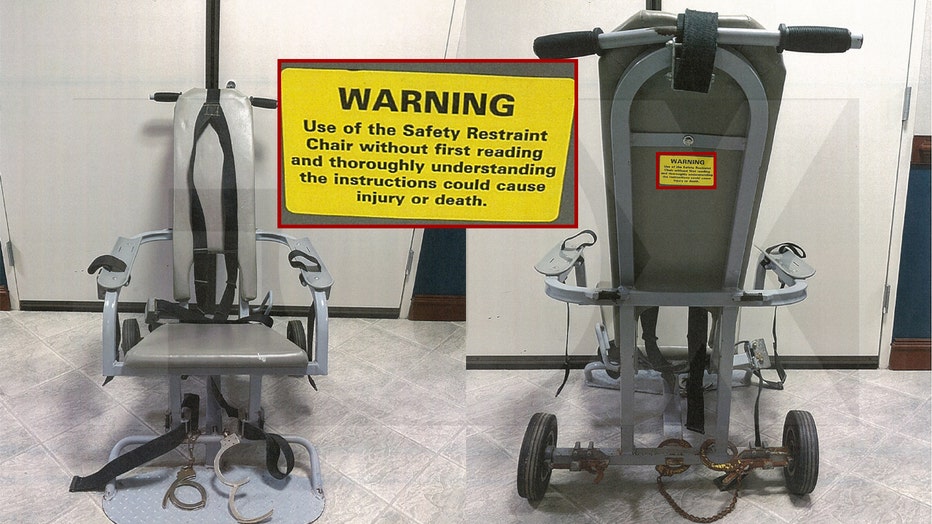Ex-Clayton County Sheriff Victor Hill sentenced to 18 months in prison over civil rights abuse charges
Former Clayton County Sheriff sentenced to federal prison
Former Clayton County Sheriff Victor Hill has been sentenced to 18 months in federal prison. Hill was convicted in October for six counts of violating the constitutional rights of detainees inside the jail.
CLAYTON COUNTY, Ga. - Victor Hill, Clayton County's former top lawman, has been sentenced to 18 months in federal prison, a judge ruled Tuesday.
In federal court, U.S. District Judge Eleanor Ross sentenced Hill to a year and a half in prison with 6 years of supervised release and 100 hours of community service.
In October 2022 a federal jury in Atlanta convicted Hill on six of seven counts of violating the constitutional rights of detainees inside the Clayton County Jail from December 2019 to May 2020 by ordering them held in restraint chairs for hours shortly after their arrests.
Prosecutors had petitioned the judge to sentence Hill to at least 46 months in prison, while Hill's defense team asked for no prison time.

The Richard B. Russell Federal Building (FOX 5)
During the sentencing hearing, four character witnesses asked Judge Ross for leniency for Hill, including a former inmate named Roderick Didon. Didon told the court Hill had become "a father figure" to him during his time in the jail and helped him get off drugs and turn his life around.
Interim Clayton County Sheriff Levon Allen, who is running in the special election to replace Hill this month, also testified as a character witness.
Prosecutors, though, argued that while people may have good things to say about Hill, those comments were not evidence in the trial against the former sheriff.
Assistant U.S. Attorney Brent Gray called Hill's actions "an affront to our criminal justice system" and a violation of "the most basic rule [...] to protect the rights of the criminally accused."

Hill's defense attorney, Drew Findling, pointed out what he sees as hypocrisy by the Department of Justice after hearings in the U.S. Senate last summer found "inhumane" conditions inside federal prisons including rat infestations. Findling also decried the use of solitary confinement in those facilities.
"What is the point of incarcerating Victor Hill?" Findling asked, labeling Hill as "a shiny object" for the prosecution.
The former sheriff himself addressed the court and contended that his forced retirement and loss of his POST certification was punishment enough for his crimes.
"Everything that I did [...] I believe was in the confines of the law," Hill said.

Judge Ross admitted in court that she "truly struggled" with Hill's case, in part because it is a unique situation.
Generally, cases involving civil rights violations by law enforcement officers involve the defendant injuring or killing someone, like in the case of George Floyd.
Hill is also a polarizing figure. Ross said she received many letters from people both advocating for and against the former sheriff, including those who claim he wrongfully terminated them.
"You are either a hero or a villain," Judge Ross told him.

She, however, reminded everyone in the courtroom that her job is not to punish Hill for everything he has ever done or everything he has ever been accused of doing.
"As much as you loved the law, your love of power overcame that," Judge Ross said to Hill.
She also mentioned Hill's "arrogance" more than once.
Based on Hill's testimony during the trial and social media posts made afterwards, Ross said "I'm not sure whether or not you've learned your lesson."
"My sincere prayer for you is that you can just sit down for a moment and think about everything," Judge Ross told Hill.

While the Department of Justice celebrated the sentence and said they hope it will bring closure to the victims, Findling said his team plans to appeal Hill's conviction on two grounds.
First, they believe the unusual circumstances surrounding the jury's four days of deliberations could be compelling. One juror was brought in for questioning in court after fellow jurors accused him of being difficult.
Second, Findling said the DOJ never gave Hill notice that use of a restraint chair could lead to criminal charges.
"There could have been a consent decree, right? Very simply the Department of Justice could have come in and said, 'Sheriff Hill, we think you're doing this wrong. We want you to suspend or modify your use over the next 12 or 18 months.' They chose not to do that and they chose just to prosecute him," Findling explained.

The Richard B. Russell Federal Building (FOX 5)
As part of Hill's sentence, Judge Ross said he is not allowed to work in law enforcement in any capacity until the completion of his supervised release, including in an advisory or consulting role.
Hill asked if he could still publicly support a candidate for the sheriff's office and Judge Ross said that would be okay. Hill has been front and center as Interim Sheriff Levon Allen campaigns to become Hill's permanent replacement.
What was the evidence presented at Victor Hill's trial?
Former Clayton County Sheriff Victor Hill to be sentenced
Last year, a federal jury convicted former Clayton County Sheriff Victor Hill on six counts of violating the constitutional rights of detainees inside the Clayton County Jail by ordering them held in restraint chairs for hours shortly after their arrests.
A cell phone video recorded by a former Clayton County Sheriff's Office employee captured the then-sheriff's conversation with a man named Joseph Arnold as he was booked into the jail on Feb. 25, 2020. Arnold was accused of assaulting two women inside a Forest Park grocery store earlier that month.
VIDEO, PHOTOS REVEAL EVIDENCE THAT CONVICTED SHERIFF VICTOR HILL IN FEDERAL TRIAL

A sketch of Clayton County Sheriff Victor Hill in federal court. (Provided by Lauren Lacy)
"What was you doing in Clayton County that day?" Hill asked Arnold.
"It's a democracy, sir. It's the United States," Arnold replied.
"No, it's not. Not in my county," responded Hill.
When Arnold challenged Hill on his right "to a fair and speedy trial," Hill told sheriff's office employees to bring him a restraint chair.
"Roll that chair 'round here," Hill ordered. "Roll that chair 'round here."
Video: Victor Hill confronts inmate Joseph Arnold before being restrained
In video evidence obtained by FOX 5, Victor Hill can be heard berating inmate Joseph Arnold before ordering he be strapped into a restraint chair. This is just some of the visual evidence obtained by FOX 5 from the federal trial of the former Clayton County sheriff.
Prosecutors also introduced surveillance videos from inside the jail that showed Sheriff Hill's interactions with Glenn Howell on April 27, 2020. Howell, a landscaper, had a dispute with a Clayton County Sheriff's Office deputy about payment for work that Howell did on the deputy's property.
Sheriff Hill called Howell to try to intervene and the conversation became heated. When Howell tried to contact Hill again, Hill obtained a warrant for Howell's arrest on a charge of harassing communications. Howell turned himself in a few days later.
In the video, Howell is pictured sitting on a bench for several minutes. He appears to follow commands as an intake officer searches him and processes his belongings. At one point, prosecutors pointed out, jail staff left Howell alone in the intake area—something attorneys argued they would not have done if Howell was a threat.
Video: Victor Hill confronts inmate Glen Howell, strapped in restraint chair
In video evidence obtained by FOX 5, Glen Howell can be seen being confronted by former Clayton County Sheriff Victor Hill after being strapped into a restraint chair. This is just some of the visual evidence obtained by FOX 5 from the federal trial of former Clayton County Sheriff Victor Hill. Please note there is no audio on this video.
Footage shows Hill arriving about an hour later and speaking to Howell in the hallway. Less than a minute into the conversation, Howell was placed into a waiting restraint chair.
According to a 2018 policy approved by Hill, restraint chairs "may be used by security staff to provide safe containment of an inmate exhibiting violent or uncontrollable behavior and to prevent self-injury, injury to others or property damage when other control techniques are not effective." The sheriff's office restraint chair policy explains that officers should remove someone from the device "when they have determined that there is no longer a threat to self or others, or the inmate must be transported to another facility."
Multiple witnesses, however, testified that when Sheriff Hill ordered someone into a restraint chair, it was understood that person was not to be released for four hours, the maximum allowed under the policy.

These images show the restraint chair used at the Clayton County Jail and a close-up of the warning label on the back. This is just some of the visual evidence obtained by FOX 5 from the federal trial of former Victor Hill. (Supplied)
During the trial, two former jail detainees testified that deputies kept them in restraint chairs for hours, leaving them in pain and causing them to urinate on themselves while they were bound.
One of them testified it felt "like torture."
Sheriff Hill took the stand in his own defense and testified that he stood by his decisions to restrain the detainees, telling jurors he "acted lawfully."
The jury, however, disagreed in six of the seven instances, convicting him for violating the rights of Arnold, Howell, Desmond Bailey, Raheem Peterkin, Walter Thomas and a 17-year-old, who FOX 5 has chosen not to identify.

